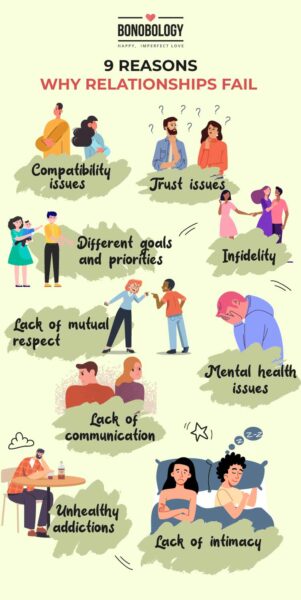It doesn’t matter if relationships fail after 2 years or 20, by getting to the root causes that spell trouble in your romantic paradise you can make sure your next one is the last. Whether you’re here for precautionary reasons or to see if that nasty fight you had has the potential to end things, knowing why do relationships fail can help. With the help of clinical psychologist Devaleena Ghosh (M.Res, Manchester University), founder of Kornash: The Lifestyle Management School, who specializes in couples counseling and family therapy, let’s take a look at the top reasons why relationships fail.
Top 9 Reasons Why Relationships Fail
Liah and Marcus’ relationship looked like the explosive kind. A lot of gifts, clinginess, and spending almost all their time together. On paper and to all their friends, it seemed as though this 4-month-long relationship was going to stand the test of time. However, Liah and Marcus, along with everyone else around them, let one important detail slip through the cracks – that compatibility issues are among the top reasons why relationships fail. Liah’s resolute atheistic and meat-eating lifestyle didn’t sit well with Marcus, a religious vegan. As time went by, they realized they were nothing like the people they thought they were. They had cooked up versions of each other in their heads rather than actually getting to know each other. When the real thing didn’t fit the bill, they found themselves drifting apart in the relationship. The reasons why relationships fail can be plenty since each dynamic experiences its own problems. Whether you can work through them or not is up to you to decide, but understanding what poses a bigger threat than you thought it did is important. This list of reasons to answer the question, “Why do relationships fail?” is going to help you with just that:
1. Why do most relationships fail? Trust issues
If someone were to ask her, “Why do relationships fail?”, Devaleena says that she’d place trust issues at the top of the rung. “It’s the biggest reason for conflicts and a major red flag. People who have trust issues have extremely difficult relationships. If it’s not addressed, the chances of it falling apart are very high. “Such issues can stem from current or past experiences with being cheated on, or going through a hurtful situation with a partner. It’s a very strong possibility that this person has seen parental conflict while growing up. The fear of what will happen if a fight leads to a parent leaving creates trust issues in most romantic relationships in adulthood. “Since a person with trust issues constantly feels that there’s something their partner is not telling them, it piles on and leads to conflict,” she explains. Helping someone with trust issues is pertinent if you want to give your relationship a fighting chance of survival.
2. Compatibility issues
According to studies, incompatibility is one of the most commonly cited reasons for divorce. No, we don’t mean the kind of incompatibility when Jerry Seinfeld broke up with a partner because she ate her peas one at a time in an episode of Seinfeld. We mean the kind that makes it seem like it’s impossible to live with an activist politician when you’re aloof and in your own world. “Compatibility issues are one of the top reasons why relationships fail. Compatibility not only talks about having similar interests, it talks about having similar values, having compatible libidos, having a similar and healthy way of working through conflicts. When you’re not compatible with the way your partner behaves or handles stress, it leads to constant arguments and fights,” says Devaleena.
3. Different goals and priorities
“I knew he never wanted kids, and I foolishly assumed he’d change his mind, or that things would magically work out,” Joanne told us. “I wanted to settle down and start a family of our own, he had no interest in suburban life. What crushes me is that after saying he’ll stick with me, seven months into my pregnancy, he decided he can’t let this tie him down.” The rose-tinted glasses you’ve involuntarily put on at the beginning of your relationship during the honeymoon phase may make you think that the different life goals you two have will eventually smoothen themselves out. But as things begin to get more serious, you realize that your partner’s dream of buying a caravan wasn’t a fad. To them, it’s the perfect retirement plan. As was the case with Joanne, the answer to why do relationships fail during pregnancy can be starkly different goals a couple had established in their own minds.
4. A lack of respect
Unfortunately, what the Beatles so sweetly proclaimed isn’t true. Love isn’t all you need, and a lot of mutual respect is the basic fundamental of any relationship, be it with a colleague, a friend or a romantic partner. Why do relationships fail? The answer could well be a lack of respect. When it feels like your partner is dismissing every opinion or idea you have because they don’t respect you much, it’s bound to cause rifts. If it feels like your partner never cares enough to listen to you or they speak to you during fights like they couldn’t care less about how the words hurt you, the lack of respect is glaring. “When one partner lacks respect for the other, it can be detrimental. At some point, the person who feels disrespected may just snap, which will make it seem like every conversation turns into an argument. Of all the reasons why relationships fail, a lack of respect can result in one of the most hostile ways of splitting up,” says Devaleena.
5. Infidelity remains one of the top reasons why relationships fail
Coming as a surprise to absolutely no one, the act of infidelity in a relationship remains to be one of the biggest reasons for divorce and breakups, according to studies. According to the APA, about 16% of couples admitted to cheating on their partners while being married to them. According to a 2021 survey, of those who admitted to cheating on their primary partner, 86% split up either immediately or shortly after the admission. Though the consequences are clear and you may have pledged loyalty to your partner, infidelity remains to be one of the major reasons why relationships fail in this generation.
6. A severe lack of communication
Why do relationships fail? It’s not hard to see the reason behind it if all a couple talks about is household chores or things they need to do with the kids. In younger relationships, a lack of communication may make itself apparent when there’s a lack of meaningful conversations that lead to an emotional distancing between the two. “A lot of times, I’ve seen people put up with it for decades before realizing they can’t go on with their partner’s lack of communication anymore. They may try to make peace with the way they think their partner is, and not say much about it. Other times, people may realize it right at the onset, when the incompatibility through the lack of communication affects the relationship very clearly,” says Devaleena.
7. Mental health issues
“It’s not just because an individual has a mental health disorder but also because of the taboo attached to it,” says Devaleena, explaining that the answer to why do relationships fail can sometimes be a mental health issue. She adds, “A lot of times, because of social stigma, people do not talk about their struggles with mental health, which in turn means the issue is left undiagnosed. Unidentified mental health issues wreak havoc in a relationship, eventually leading to its breakdown. “This hesitancy to disclose that something is not right with oneself to one’s partner can also lead to distancing. The people who suffer from depression, anxiety, BPD or NPD to name a few, behave in ways that become extremely difficult for the other person to take. This is especially difficult if their partners don’t know what they’re going through.” It’s unfortunate, but the answer to why do relationships fail during pregnancy, or even why they fail in general, can be because of untreated mental health issues. If you think you or your partner are currently going through a mental health illness that is negatively affecting your relationship, Bonobology’s panel of experienced therapists can guide you to the harmonious relationship you yearn for.
8. Unhealthy addictions
“Two people who have addictions – even if it’s to two different substances or things – might just end up sticking around. But if a non-addict is paired up with an addict, it becomes very difficult because their pattern of thinking or general ways of being are very different from each other.“The person who is not addicted finds it very difficult to adjust to the addict’s way of life. Be it drug addiction, an alcohol dependency or any other kind of addiction that’s causing a negative impact, it remains one of the main reasons why relationships fail nowadays and has been in the past,” says Devaleena. Addictions don’t always take the shape of drug or alcohol addictions either. Of all the types of cheating, “object cheating” is probably one that slips by unnoticed. When a partner gets unhealthily obsessed with a hobby or activity, it can be just as detrimental. Who knew the answer to, “Why do relationships fail?”, can also be because your partner suddenly decided to spend eight hours on their newfound cycling hobby.
9. A lack of intimacy
If you’re figuring out why do relationships fail after 7 years or more, a lack of intimacy might be to blame. Devaleena explains the problems it can pose, and how to potentially fix them. “While sex is not the most important factor in a relationship, a lack of emotional and physical intimacy can lead to angry outbursts, infidelity, communication issues, and lack of self-esteem. “When a person harbors this dissatisfaction for a long time, they harbor a deep sense of anger and resentment toward their partner. To fix it, you must address the sense of lethargy that has taken over your relationship. Try to make sure the interest you have in each other doesn’t wane off. “Invariably, people who suffer from lack of intimacy have communication problems. There might be a lack of interest or harsh words. Improving communication is a must, to be able to be vulnerable with each other. That’s another important aspect of fixing the lack of intimacy, make sure you’re capable of being vulnerable with each other from time to time.”
At What Point Do Most Relationships Fail?
Though the data and the figures are all highly subjective, they all point toward the fact that the “7-year itch” is no longer a thing. In fact, relationships fail in this generation way earlier than that. According to the Daily Mail, a survey of 1953 UK adults who had all ended their relationships revealed that most relationships fail after 2 years and 9 months. The same study claimed that relationships largely fail nowadays because of communication gaps, and some dissatisfied partners explicitly blamed social media for their partner’s infidelity or the lack of attention. Of all the data and the studies you can get your hands across, the commonality is that most relationships tend to fail during the first few years, and the chances of breaking up significantly reduce as time goes on. According to the findings of the Washington Post, around 70% of unmarried heterosexual couples break up during their first year. Whether that’s because relationships fail nowadays due to fickle reasons or if people tend to rush into romantic affiliations is up for debate. The average length of relationships also depends on age. Studies suggest that teenage relationships last anywhere between 5 months to 1.8 years. The average length of relationships for 20-year-olds is about 4 years, according to Vice. Keeping in tune with the trend, the relationships that 30 to 50-year-olds form often tend to last longer, according to statistics. Now that you know there’s really no point in asking, “Why do relationships fail after 7 years?”, perhaps you should consider finding out why do relationships fail after 2 years instead.Now that you know the answer to why do relationships fail, all you need is to understand what the essentials of any relationship are, and what you must do to establish them. Hopefully, we’ve got you started on your journey toward a harmonious relationship.



